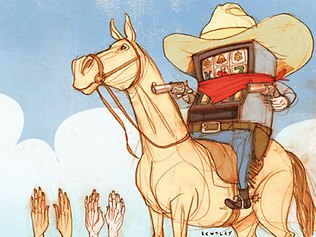Search
Democracy Links
Member's Off-site Blogs
D.E.M.O.C.R.A.$.Y......

Selling Australian voters to the highest bidder.
Australia is a representative democracy. This is to say, we vote for candidates to carry out the business of governing on our behalf.
For the most part, this arrangement makes a lot of sense. There a whole lot of issues that are so complex or so nit-pickingly detailed, that we the public don’t need or don’t want to have an opinion.
So we put our faith in our politicians to sift the evidence and decide for us, in our best interests.
On the other hand, there are some issues which are quite fundamental and simple to comprehend, on which we can rightly expect our politicians to respond to informed public opinion.
Like, for example, the social harm done by gambling. The regulation of poker machines is not some arcane area of law like, say, intellectual property rights. It falls within the lived experience of many of us. The evidence of its harm is comprehensible to anyone who takes a little time to consider the facts.
So, one would think it would be an area in which our politicians would be mindful of public opinion, for it is an area in which public opinion is particularly well-informed.
And we know what public opinion is on the subject. It wants greater regulation of gambling.
Some statistics here. Back in April 2011, when the government was contemplating stricter controls, a Nielsen poll asked a representative sample of people whether they supported or opposed a plan “to require gamblers to nominate in advance how much they can afford to lose” before being allowed to gamble.
Sixty-six per cent of respondents said yes.
This was a pretty amazing result given that it came despite a massive public campaign by vested interests opposed to the poker-machine reforms. And it was a massive endorsement of those reforms, which had been foreshadowed by independent MP Andrew Wilkie, as the price of his support for the minority Labor Government.
So in May, Wilkie outlined his plan, including so-called “voluntary pre-commitment”. You would think the big parties would have jumped right onboard.
But, as we know, they did not. Labor was lukewarm but obliged; then-Opposition leader Tony Abbott foreshadowed that a future Coalition government would rescind the reforms.
And yet, public opinion remained strongly in favour of change, although not quite as strongly, as Nielsen’s director of research John Stirton points out. Overall it fell to 61 per cent approval, but this was due almost entirely to a larger fall among Coalition voters, who obligingly changed their opinions to follow their party.
Even so, a narrow (51 per cent) majority of conservative voters wanted gambling reform. Support for it remained overwhelming among Labor and Greens voters.
Anyway, to cut a long story short, after some two-and-a-half years of urging, Labor got pokie-reform legislation passed.
So, fast forward to the first day of the last sitting week of the 2013 Parliamentary year, and a sad little press conference held by an odd coalition of people in favour of poker-machine reform.
There was the Rev. Tim Costello, chair of the Australian Churches’ Gambling Taskforce, the DLP Senator John Madigan, the Greens’ Richard diNatale, and Independent senator Nick Xenophon.
They were there to lament the death of reform. The story is that the new government, in typically sneaky fashion, slid the repeal of the gambling reforms into an omnibus bill on social services.
When they noticed, the minor party players who had pushed so hard for the reforms were initially not so concerned. They assumed Labor would stand with them to oppose the Government measures in the Senate.
But no. Labor cravenly, quietly determined it would vote down the reform legislation it had so recently passed.
Now, the word is that many in the ALP are deeply unhappy about this. Tim Costello who, after a couple of years lobbying on the subject is in a position to know, named a couple of Labor people – families and disabilities spokesperson Jenny Macklin and deputy leader Tanya Plibersek – who were “devastated” by the backflip.
And he asserted that Labor’s change was driven by the NSW right of the party, and also some Queensland right-wing members.
Which makes sense. On a broad range of social issues, and certainly when it comes to matters of principle and money, the Labor right is pretty much indistinguishable from the Liberal Party.
The Greens’ diNatale whaled into the Abbott Government, saying:
“That one of the Abbott Government’s first bills gives the pokies industry everything it wants, at the expense of vulnerable families, tells you everything you need to know about this Government.
“The Abbott Government’s agenda isn’t about helping Aussie families, it’s about doing the bidding of the big end of town.”
Which was true, but only half the story. Since it first began contemplating pokie reform, Labor has watched the gambling lobby funnel million of dollars to its political opponents.
It wants to share in those donations again. So it, too, is doing the bidding of the big end of town.
This is not representative democracy. Unless democracy is represented by a dollar sign.
- By John Richardson at 14 Dec 2013 - 5:11pm
- John Richardson's blog
- Login or register to post comments
Recent comments
22 min 10 sec ago
2 hours 30 min ago
3 hours 57 min ago
18 hours 14 min ago
18 hours 12 min ago
19 hours 14 min ago
23 hours 19 min ago
1 day 3 hours ago
1 day 3 hours ago
1 day 3 hours ago